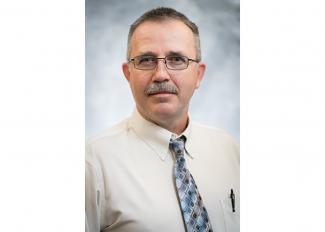During his career with NETL, U.S. Army veteran Jimmy Thornton has worked tirelessly to advance new technology development for Fossil Energy (FE), and that remains true today with current efforts to investigate uses for artificial intelligence (AI) and machine learning (ML) for FE technology development.
Born in Kentucky and growing up in Campbells Creek, Thornton joined the U.S. Army at the encouragement of his high school baseball coach who was an Army Reserve drill instructor. Trained as an infantryman and entering service in early 1983, Thornton was stationed in Germany, where he completed French Commando School in Givet, France.
Leaving active service in 1987, Thornton joined the Kentucky National Guard while studying at Eastern Kentucky University, and he later transferred to the West Virginia National Guard after accepting a professional internship with the U.S. Department of Energy (DOE) in Morgantown in 1988. Commissioned as an officer in 1992, he served with the 201st Field Artillery and was deployed to Iraq in 2004 during Operation Iraqi Freedom.
Achieving the rank of major, Thornton retired in 2010 with more than 27 years of service and continues to serve the 201st as an active member of the 201st Association. He said many of the skills and life lessons the army taught him continue to guide him at NETL, where he started working in 1991 when it was known as the Morgantown Energy Technology Center.
“I learned to work hard at an early age, but with the determination and focus on the task at hand to ensure it’s done properly…the military places enormous emphasis on that skill,” he said. “Make sure you know what you are doing and do the job and task to the best of your ability. . . grow and learn from your mistakes.”
Thornton’s work at the Lab as associate director for the Computational Science and Engineering directorate includes advances in applied artificial intelligence, and machine learning, which he said have great potential to benefit the country’s energy industries, especially the existing fleet of coal-fired power plants and the subsurface. He noted that increased data availability and the use of supercomputers can speed up the development cycle of new tools for decision making because machine learning techniques can provide insights beyond our current understanding.
“Computational science and engineering capabilities, including machine learning, enable us to develop technology faster at lower risk and at less cost,” he said. “You might argue that a supercomputer costs a lot money, but if you talk about putting together a pilot-scale project and testing based off of real data, then redesign and additional testing…that costs a lot of money too — especially if you’re carrying out complex projects frequently.”
Thornton said a recent example of this is the redesign efforts at the DOE’s Idaho nuclear waste cleanup facility.
“They had problems with the unit there,” Thornton explained. “We conducted device simulations of the existing design to help diagnose the problem and inform design changes. Then we performed high-fidelity simulations and evaluations of different designs to see which one performed the best. Then the engineers at Idaho made those design changes and ran a successful test. That saved tens of millions of dollars just by using NETL’s computational science capabilities.”
NETL’s John Rockey said the work of Thornton’s directorate work could have tremendous impact when it comes to reducing costs for industry, notably for coal. Even as natural gas use rises, coal still powers a substantial portion of the nation’s economy, and helping coal-fired power plants maximize their efficiency leads to lower costs for consumers in the long term. This is even more important considering many of the plants are more than 40 years old. Improving their operations can avert their shutdown for years, Rockey said.
Thornton said AI and ML are being leveraged in many business sectors today, such as online commerce and self-driving cars, with tremendous success. DOE and FE recognize the great potential of this capability to technology development for the energy sector, and are planning significant investments in capability plus have initiatives in several technology programs to accelerate R&D efforts that leverage AI and ML.
With the right models and machinery, Thornton and Rockey said power plants can more easily detect deficiencies and newer innovations can be adopted to extend their operations without the need to build new plants from the ground up.
More effective means of recovering oil and gas is another potential pay-off to this research. Thornton said increasing the efficiency of this process by 10 percent can have huge implications for American energy independence and economic development.
“There’s an enormous amount of opportunity with this technology,” Thornton said. “It’s just in its infancy when applying it to fossil fuels and the energy arena.”
Thornton reflected proudly on the work he and his colleagues have performed at the Lab since he first arrived in 1988 as a student intern.
“I was inspired by my early work here at NETL,” he said, “but the people really made being here for 30 years what it is. When I was deployed, they came together to go over to my house to cut wood for the wood burner in my basement for my wife. They pulled together care packages and sent them while I was overseas…that kind of thoughtfulness, they’re just great people.”
Rockey also recalled Thornton’s immense devotion to family and strong work ethic. With his wife, Petra, pregnant with their first child, Thornton took on the responsibility of raising his youngest brother after their mother was diagnosed with cancer. He did this while he was in his 20s working as a part time intern for NETL while studying computer science and electrical engineering at West Virginia University.
“As far as I am concerned, there is no better human being on earth than Jimmy Thornton,” Rockey said. “I can remember coming to work and Jimmy always being on top of everything associated with his job, while having been up studying until late in the evening or early in the morning.”




